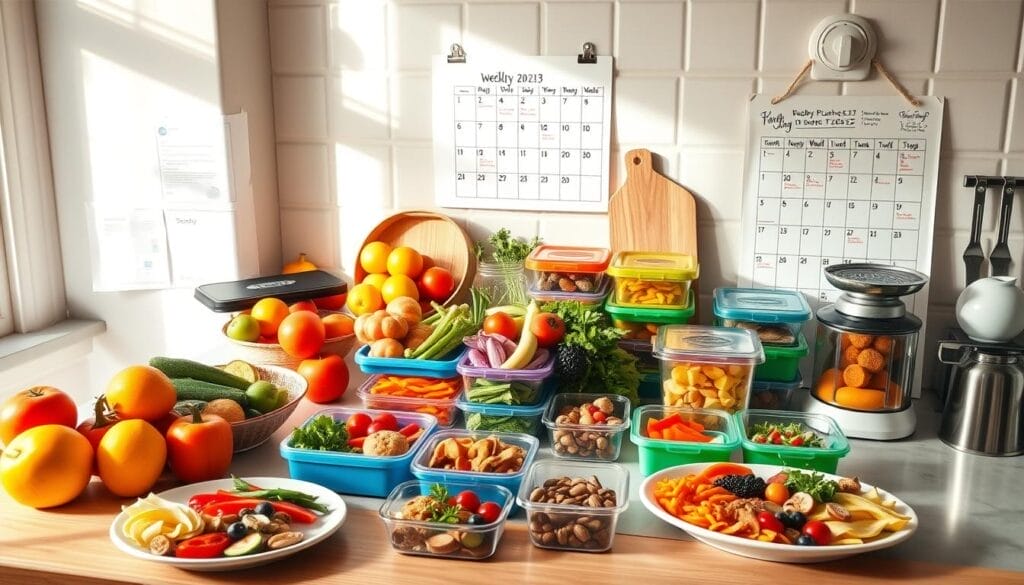This post may contain affiliate links, read more…
Creating a healthy daily routine is more than just following a schedule. It’s about building a lifestyle that boosts your health and happiness. I’ve learned that making healthy habits is a journey of self-care and growth.
I found out that a healthy routine isn’t about being perfect. It’s about making small, steady choices that change your life. When I started working on my wellness, I saw how important structure and purpose are.
Building a healthy routine takes time, effort, and flexibility. Everyone’s journey is unique, but the key principles are the same. Focus on your health, listen to your body, and choose habits that support your wellness goals.
Key Takeaways
- Start with small, manageable changes in your daily routine
- Focus on consistency over perfection
- Listen to your body and adjust habits accordingly
- Embrace a holistic approach to building healthy habits
- Be patient and kind to yourself during the process
Understanding the Impact of Daily Routines on Overall Wellness
Our daily routines are more powerful than we think. They are the base of our physical and mental health. They shape our long-term health in big ways.
Consistent habits are key to our well-being. Predictable patterns help our bodies and minds work better. Let’s look at the main health benefits of daily routines:
- Reduced stress levels
- Improved mental clarity
- Enhanced physical health
- Better sleep quality
- Increased productivity
Physical and Mental Benefits of Consistent Habits
Our bodies love predictability. Consistent habits create stability that helps our internal systems. This stability boosts our physical health in many ways.
“Your daily routine is the foundation of your health. Build it wisely, and your body will thank you.” – Dr. Emily Roberts, Wellness Expert
How Routines Shape Long-term Health Outcomes
Daily routines have a big impact over time. Small actions add up, leading to big health improvements. Keeping a regular sleep schedule, practicing mindfulness, or exercising regularly all help build a strong health base.
By understanding and using smart daily routines, we can improve our health. Every small choice helps build a healthier, more balanced life.
Starting Your Morning Right: Essential Wake-up Habits
Changing your morning routine can greatly improve your health and productivity. Wake-up habits are not just actions. They are the base for a successful day.
My journey to a better morning routine took time. I learned that small habits can make a big difference in how you feel.
- Hydrate immediately after waking
- Practice gentle morning stretches
- Expose yourself to natural light
- Create a consistent wake-up time
Starting a morning routine doesn’t mean you have to be perfect. It’s about building habits that energize and prepare you for the day.
| Wake-up Habit | Benefit | Time Required |
|---|---|---|
| Drinking water | Rehydration | 2-3 minutes |
| Stretching | Muscle activation | 5-10 minutes |
| Meditation | Mental clarity | 10 minutes |
Pro tip: Start small and gradually build your morning routine. Consistency matters more than perfection.
Your morning routine should be personal and energizing. Try different habits until you find the perfect mix for you.
Simple Steps to Create Healthy Routine: A Comprehensive Guide
Building a sustainable lifestyle takes time. It needs patience, strategy, and a steady commitment to change. I learned that making small, consistent changes can lead to big results over time.
Creating Sustainable Changes
To start a healthy routine, first set realistic goals. Break down big goals into smaller steps that seem doable. Here are some tips:
- Start with 2-3 habits to change
- Make your goals clear and specific
- Set up your environment to support your goals
- Get rid of things that might stop you
Tracking Progress and Adjustments
To track your progress well, use a simple system. Consistency is more important than being perfect. Here are some tools to help:
- Daily habit tracking apps
- Keeping a journal
- Reflecting on your week
“Success is the sum of small efforts, repeated day in and day out.” – Robert Collier
Building Momentum Through Small Wins
Success comes from celebrating small wins. Each victory boosts your confidence and helps you stick to good habits. Remember, it’s about progress, not being perfect. Changing your lifestyle is a journey.
My advice? Begin with small steps, stay consistent, and be gentle with yourself along the way.
Nutrition Planning and Meal Scheduling

Nutrition planning is more than just counting calories. It’s about giving your body the nutrients it needs. I found that meal scheduling can change how you eat and feel.
“Food is medicine, and your kitchen is your primary pharmacy.” – Anonymous Health Coach
To make a good nutrition plan, you need to think strategically and practically. Successful meal scheduling involves a few important steps:
- Know what your body needs nutrition-wise
- Prepare meals ahead of time to cut down on stress
- Balance your macronutrients for steady energy
- Use a variety of colorful ingredients
Here are some practical tips for nutrition planning that have helped me:
| Strategy | Benefits | Implementation |
|---|---|---|
| Weekend Meal Prep | Saves time, reduces impulse eating | Cook 3-4 base recipes for quick assembly |
| Balanced Plate Method | Ensures nutritional completeness | ½ vegetables, ¼ protein, ¼ complex carbs |
| Smart Grocery Shopping | Prevents unhealthy food purchases | Create list, shop after meals |
Remember, healthy eating habits are about being consistent, not perfect. Start small, be patient, and see how nutrition planning changes your energy and health!
Incorporating Physical Activity Into Your Daily Schedule
Movement is key to feeling great. It’s not just about looking good. It’s about feeling amazing inside and out. I’ve found that the right exercise routine can change how you see wellness.
Starting with movement doesn’t have to be hard. It’s about knowing your body and finding what works for you. Make it something you enjoy.
Finding Your Peak Exercise Time
Not everyone likes morning workouts. Your best time depends on when you feel most energetic. Some do best in the morning, others in the afternoon or evening.
- Morning exercisers: Boost metabolism and energy levels
- Midday movers: Break up work stress and reset focus
- Evening athletes: Release daily tensions and improve sleep quality
Balancing Different Types of Movement
A good routine mixes things up. Different activities keep your body challenged and prevent boredom.
| Movement Type | Benefits | Recommended Frequency |
|---|---|---|
| Cardiovascular Exercise | Improves heart health, burns calories | 3-5 times per week |
| Strength Training | Builds muscle, increases metabolism | 2-3 times per week |
| Flexibility Work | Enhances mobility, reduces injury risk | Daily stretching |
Making Exercise Non-Negotiable
Consistency comes from treating exercise as a must-do. Start small and be patient. Remember, something is always better than nothing!
Your fitness journey is unique. Listen to your body and celebrate small wins. Make it a mix of challenge and fun.
Sleep Hygiene and Evening Wind-Down Practices

Learning about sleep hygiene can change your nights for the better. My own journey to better sleep took years. I had to adjust my evening routine to find what works.
Having a good evening routine is key to better sleep. Here are some tips to improve your sleep hygiene:
- Establish a consistent bedtime schedule
- Create a relaxing pre-sleep environment
- Limit screen time before bed
- Practice calming activities
Technology can mess with our sleep. Devices give off blue light, which can make it hard to sleep. Try to avoid screens for at least an hour before bed.
| Evening Activity | Impact on Sleep |
|---|---|
| Reading | Calming, promotes relaxation |
| Meditation | Reduces stress, improves sleep quality |
| Warm Bath | Lowers body temperature, induces sleepiness |
Pro tip: Develop a personalized wind-down ritual that signals to your body it’s time to rest. This could be gentle stretching, soft music, or deep breathing.
Remember, good sleep habits are about being consistent. Your evening routine is a powerful tool for restful sleep.
Mindfulness and Stress Management Techniques
Dealing with daily stress can be tough. It’s not just a nice-to-have skill; it’s essential for our health. Mindfulness can change how we face life’s hurdles.
First, we need to understand how stress affects us. Then, we can find ways to calm our lives.
Daily Meditation Practices
Starting a meditation habit doesn’t need to be hard. Here are some easy ways to begin:
- 5-minute morning breathing exercises
- Guided meditation apps
- Mindful walking
- Body scan relaxation technique
Stress-Reduction Strategies
Managing stress requires different methods. I’ve found some effective ways to help:
| Technique | Duration | Benefits |
|---|---|---|
| Deep Breathing | 5-10 minutes | Reduces anxiety, lowers blood pressure |
| Journaling | 15 minutes | Emotional processing, self-reflection |
| Progressive Muscle Relaxation | 20 minutes | Releases physical tension, improves sleep |
Mindfulness techniques get better with practice. Start small, be kind to yourself, and grow your stress management skills.
These methods have helped me see stress in a new light. They turn chaos into chances for growth and self-care.
Balancing Work and Personal Time
Work-life balance isn’t about being perfect. It’s about setting boundaries that protect your personal and professional life. I learned that time management is about making intentional choices, not just filling every moment.
To achieve work-life balance, you need a plan and to know yourself. Here are some ways to take back your personal time while keeping up with work:
- Set clear work hours and stick to them
- Establish digital boundaries with communication tools
- Learn to delegate tasks effectively
- Schedule dedicated personal time like important meetings
Knowing when you’re most energetic can change how you manage time. Not every hour is the same. Do your hardest work when you’re at your best.
Pro tip: Your personal time is not a luxury – it’s a necessity for sustainable professional performance.
Work-life balance is unique for everyone. The goal is to find a rhythm that supports your well-being.
Maintaining Social Connections and Relationships
Humans are naturally social, seeking connections that boost our mental health. These connections are key to a healthy life, especially during tough times.
It’s not just about having many friends. Quality matters more. Spending time on meaningful relationships can greatly enhance your health and happiness.
Scheduling Quality Time with Loved Ones
Planning for relationships is essential. Here are some tips to make social connections a priority:
- Set weekly check-in calls with family members
- Plan monthly gatherings with close friends
- Use digital tools to stay connected when physical meetings aren’t possible
- Practice active listening during interactions
Building Community Support Systems
Having a strong support network can change how you view wellness. These relationships offer emotional strength, practical help, and a feeling of belonging.
- Join local support groups
- Participate in online communities aligned with your interests
- Volunteer for organizations that resonate with your values
- Attend workshops or classes to meet like-minded individuals
Building social connections takes practice. Be kind to yourself as you grow your network and strengthen your bonds.
Conclusion
Exploring the path to a healthy lifestyle has shown us the power of daily routines. My own journey taught me that small, consistent changes can lead to big improvements in wellness. It’s not about being perfect; it’s about making progress and being kind to yourself.
The strategies we’ve talked about are real tools to help you take control of your health. Every step towards a meaningful routine brings you closer to better physical and mental health. Remember, your journey is unique, and what works for one might need tweaks for another.
Embracing a healthy lifestyle takes patience and dedication. Some days will be easier than others, and that’s okay. The important thing is to stay motivated, track your progress, and be gentle with yourself when faced with challenges. Your body and mind are strong – believe in your ability to make lasting, positive changes.
I hope these insights motivate you to take action. Your health is your most precious asset. Investing time in a thoughtful daily routine can bring amazing rewards. Start small, stay consistent, and see how these changes can transform your life.

Download your guide for free!
Learn how everyday products could be affecting your health and how simple swaps can lead to a cleaner, safer home.
Recent Posts
Share on Social

Grab your Free Gluten Free Recipe Pack
Discover 45 easy, healthy, and tasty recipes, including breakfast, lunch, dinner, treats and smoothies!
Recent Posts

How to Do a Digital Detox: Small Shifts to Reduce Stress and Clear Mental Clutter



